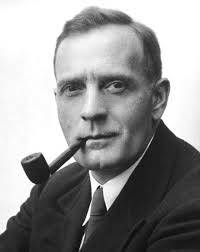### Edwin Hubble: Pioneer of Modern Astronomy
Edwin Hubble, born on November 20, 1889, in Marshfield, Missouri, was an American astronomer who revolutionized our understanding of the universe and its vastness. His groundbreaking discoveries fundamentally reshaped cosmology and cemented his legacy as one of the most influential astronomers of the 20th century.
Hubble's early life and education set the stage for his future achievements in astronomy. After obtaining degrees in mathematics and astronomy from the University of Chicago, he pursued further studies at Oxford University as a Rhodes Scholar, where he developed a keen interest in the emerging field of astrophysics.
Upon returning to the United States, Hubble began his career at the Mount Wilson Observatory near Pasadena, California, which housed the world's largest telescope at the time. It was here, during the 1920s, that Hubble made his groundbreaking discoveries that would forever change our understanding of the cosmos.
Hubble's most significant contribution came with his observations of galaxies beyond our own Milky Way. By studying the light spectra of these galaxies, Hubble demonstrated that they were receding from Earth at speeds proportional to their distance. This relationship, now known as Hubble's Law, provided compelling evidence for the expanding universe and led to the development of the Big Bang theory of cosmology.
In 1929, Hubble published his landmark paper detailing his findings, which showed that the universe was not static but rather expanding uniformly in all directions. This discovery revolutionized cosmological thinking and laid the foundation for our modern understanding of the origins and evolution of the universe.
Beyond his contributions to cosmology, Hubble also played a key role in classifying galaxies based on their shapes and structures, a system known as the Hubble sequence. His work provided a framework for organizing and studying galaxies, which remains influential in astronomy to this day.
Hubble's achievements were recognized with numerous honors and awards, including the prestigious Bruce Medal and the Gold Medal of the Royal Astronomical Society. He was elected to the National Academy of Sciences and became a highly respected figure in both scientific and public spheres.
Off the observatory, Hubble was known for his humility, dedication to research, and passion for sharing scientific knowledge with the public. His efforts helped popularize astronomy and inspire future generations of scientists to explore the mysteries of the universe.
Edwin Hubble passed away on September 28, 1953, leaving behind a profound legacy that continues to shape our understanding of the cosmos. His discoveries expanded the frontiers of human knowledge, revealing the universe's vastness and complexity while inspiring awe and curiosity about the wonders of space. Edwin Hubble's impact on astronomy and cosmology remains enduring, solidifying his place as a pioneer of modern astrophysics whose contributions continue to resonate in the scientific community and beyond.



No comments yet
Be the first to share your thoughts!